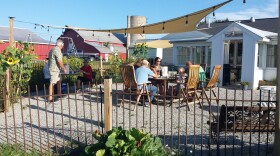Farming presents unique challenges for women. As wives of farmers, they often balance full-time jobs off the farm while raising a family. Living in sparsely populated areas means many farm women are left trying to cope with the stress alone. Today County Lines introduces us to Annie’s Project, intended to build a community among rural women in Ohio.
Monica Wood lives in Clinton County. Today, she’s in the barn with her husband training calves for the show ring.
"These calves are young,” Monica says looking into the pen. “So they're just now at the age where they should be getting on a halter regularly. [They weigh] about three, three hundred pounds. So they’re enough to get a good workout in the evening, I’m not having to pay for a gym membership. And it’s relaxing just to come and hang out - handle the calves, be in the barn, listen to the barn swallows, watch the sunset and the corn gown. It’s pretty good.”

Monica is also a full time nurse.
“I do where a lot hats,” she says sitting next to her husband in the barn. “ You know, mom. I also help with whatever needs to be done [on the farm]. That could be like over the weekend we did baleing, we baled some hay and some straw. Today we’re breaking calves here, mowing the yard, a menagerie of things.”
Last year Monica participated in Annie’s Project. It's named for Annette Fleck, who farmed alongside her husband after WWII in northern Illinois. They faced a lot of complicated problems, and later in life, Annie decided to share her struggles so other women could learn from them.
“The basis of the Annie’s program is really a women in agriculture empowerment,” Tony Nye explains in his office in Wilmington. Nye is the Ohio State University Extension agent for Clinton County. He coordinates Annie’s Project workshops for this part of Southwest Ohio.
"You wanna set the stage that they understand the good, the bad, and the ugly that comes with farming,” he says. “It is a business more so than it is a way of life anymore, but it’s still a way of life.”
Monica agrees, “It pertains to my lifestyle, so I went in with a couple of my friends and we did it kind of a girls night out in some respects, but also for us to gain knowledge of things we could take back to each of our home farms to help us grow.”
The workshops are offered sporadically through individual county extension agencies. So when a class crops up like the one Monica attended last year in Wilmington, it draws women from all over the area.
On a hot summer day in Wilmington at the Clinton County Fairgrounds, Brooke Stingley's kids are showing their 4-H projects at the County Fair. Like Monica, Brooke works as a nurse at the local hospital and on the farm.
“I help with the record keeping and the books, payroll. A little bit of the grain marketing, that’s something that I’m still learning,” she says listing all the roles she plays on the farm. "I run after parts, I try to get everybody fed. We also have about twenty head of beef cattle that we raise for freezer beef, so that’s a big responsibility that typically falls on my shoulders. Sometimes it’s a struggle.”
"It’s frightening, because farming is an everyday gamble," says Monica as she looks down at her hands. "Every day that we go to work it’s a lottery. I guess my main goal going to the program was just thinking about down the road. If I would ever be in a situation where I would have to manage the farm and continue to raise our kids by myself, that, god forbid we were in that situation, I would be able to do it. “
Tony Nye of OSU Extension says that Annie’s Project helps women manage that struggle.
“Too many times farmers and farm families think about what needs to be done today, what needs to be done tomorrow,” he says. “Okay, if a husband and wife are farming, and there are no other members to the family and the farm structure, if he gets hurt in a farm accident or gets sick, who’s going to be able to take care of those things?”
"Several of my friends have had big life events that have happened,” Monicia says in her barn. “Someone significant in their family passed away, there was a restructuring of the farm, she was the only person left on the farm and she was overwhelmed with all of the decisions, and all of the working parts that happen within that farm. [Annie’s Project] was an opportunity, one, to share that, and learn from their peers how to make it work, and to make them feel good about themselves.”
Annie’s Project is gaining popularity as more people hear about the program. Tony Nye says they went from 6 to 8 gathers the first year, to having 16 this year, and they want to build upon that camaraderie that comes with the program.
“I think it was important to have that Annie's Project experience because you really got the opportunity to see people at different stages of their life,” Monica says. “And to touch base with each other, even months down the road, just check in and say ‘how’s it going with you and your sons, or you and your daughter? How’s it going with that project you decided to take on to sustain your farm?' And so those opportunities are priceless.”
County Lines is WYSO's series on rural life, made possible by a grant from Ohio Humanities.




